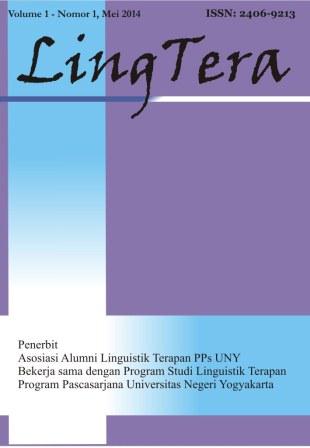Improving students' essay writing skills by implementing peer feedback
DOI:
https://doi.org/10.21831/lt.v7i1.14569Keywords:
peer-feedback, writing, essayAbstract
The aim of this research is improving the students' writing skill by implementing peer feedback. This study was a three cycle classroom action research at the English Education Department of Ahmad Dahlan University (UAD), Yogyakarta. It focused on the four aspects:designing and teaching the writing class implementing peer feedback, providing writing materials, varying tasks and enhancing students' participation and interaction with peers in the learning process. The subjects consisted of 22 semester 4 students of Essay Writing-Class E. The quantitative data were collected through students' essay scores, whereas the qualitative data were through fieldnotes, interview and portfolio. The research results in these findings. First, the students' participation in the learning process is enhanced through their pair work, group work and whole class activity. By working collaboratively, the students take advantages of giving feedback improving their essay on these aspects:organization, content, grammar, spelling, punctuation, and mechanics, style and quality of expression. Second, the students' essay writing improves after peer feedback.Their essay mean scores increase from 63.09; 67.23 to 70.09.
References
Bitchener, J. & Ferris, D.R. (2012). Written corrective feedback in second language acquisition and writing.New York: Routledge.
Brown, H.D. (2001). Teaching by principles. New York: Longman.
Brown, H.D. (2004). Language assessment: Principles and classroom practices. New York: Longman.
Burns, A. (1999). Collaborative action research for English language teachers.Cambridge: Cambridge University Press.
Burns, A. (2010). Doing action research in English language teaching. New York: Routledge.
Fatimah,N. (2013). Studieksplorasimengenaikebutuhanmahasiswa (needs analysis) untuk materi academic writing di Program StudiPendidikanBahasaInggris.Research Report, unpublished, Universitas Ahmad Dahlan,Yogyakarta.
Harmer, J. (2004). The practice of English language teaching. Harlow: Pearson Education Limited.
Hyland, K. (2003). Second language writing.Cambridge: Cambridge University Press.
Lundstrom, K & Baker W. (2009). To give is better than to receive: The benefits of peer review to the reviewer's own writing.Journal on Second Language Writing. 8(2009).30-43
Madya, S. (2007).Teoridanpraktikpenelitiantindakan. Bandung: Alfabeta.
Moore, C. &Teather, S. 2013. Engaging students in peer review: Feedabck as learning. Issues in Educational Research, www.iier.org.au/iier23/moore.pdf
Nation, I.S.P. 2009.Teaching ESL/EFL reading and writing. New York: Routledge.
Richards, J.C. (2015). Key issues in language teaching. Cambridge: Cambridge University Press.
Rofiudin. (2011, November). Improving students' ability to write descriptive texts through peer assessment, Proceedings of the 58th TEFLIN International Conference, IKIP PGRI Semarang, Semarang, Indonesia.569-572.
Ryo, Mi-Lim & M.L. Wing. (2012). Skill level based cooperative peer feedback in EFL writing students.The Journal of Asia TEFL.Vol. 9, No. 1, pp. 95-131. Spring 2012.
Sahertian, F. (2011, November). Students' response toward peer review panel in writing class.Proceedings of the 58th TEFLIN International Conference, IKIP PGRI Semarang, Semarang, Indonesia.295-300.
Sucipto. (2014). The power of feedback to enhance writing skill. Proceedings of Seminar on English Language and Teaching. Padang, Indonesia. 424-430.
Downloads
Published
How to Cite
Issue
Section
Citation Check
License
LingTera allows readers to read, download, copy, distribute, print, search, or link to its articles' full texts and allows readers to use them for any other lawful purpose. The journal allows the author(s) to hold the copyright without restrictions. Finally, the journal allows the author(s) to retain publishing rights without restrictions.
- Authors are allowed to archive their submitted articles in an open-access repository.
- Authors are allowed to archive the final published article in an open-access repository with an acknowledgment of its initial publication in this journal.

Psychology, Evaluation, and Technology in Educational Research is licensed under a Creative Commons Attribution-ShareAlike 4.0 International License.
Based on a work at https://petier.org/index.php/PETIER.









